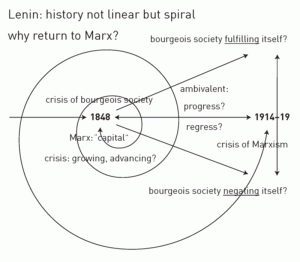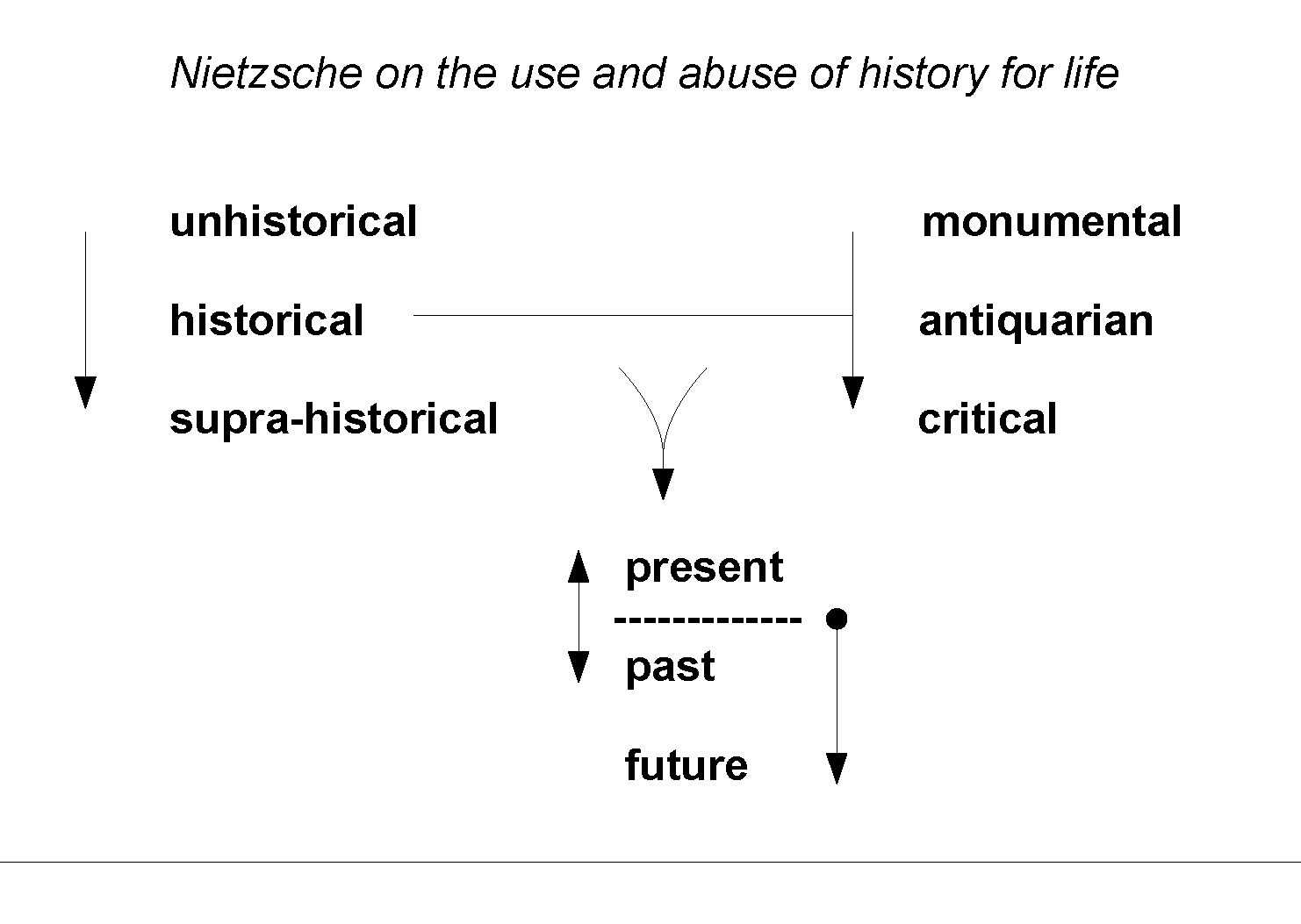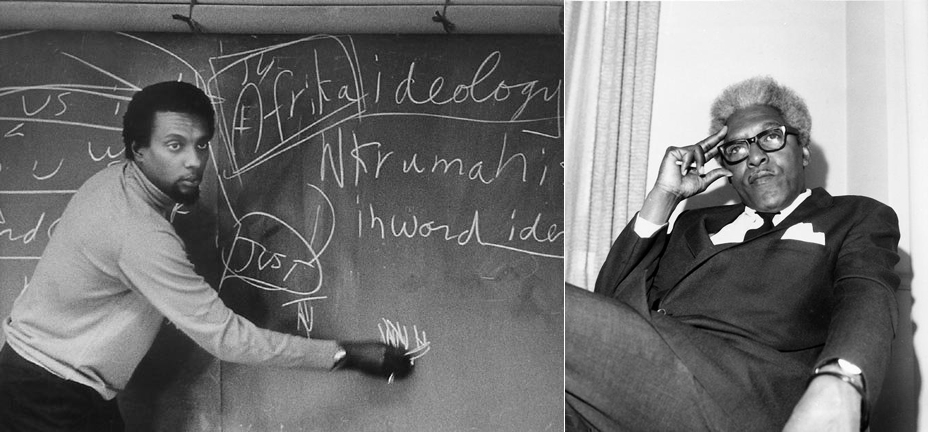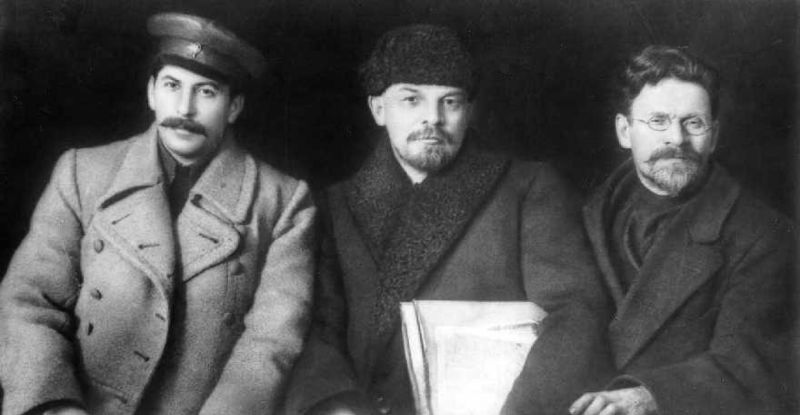The death of Marxism and the emergence of neo-liberalism and neo-anarchism
Chris Cutrone
At the 2012 Platypus Affiliated Society’s (PAS) annual International Convention, held at the School of the Art Institute of Chicago March 30–April 1, Chris Cutrone, President of the PAS, delivered the following presentation, which has been edited for clarity. A full audio recording is available online at <http://archive.org/details/2012PresidentsReport>.
IN THE TRADITION we established just two years ago, there is a Platypus President’s report, speaking to the historical moment. At our convention last year, I presented on the “anti-fa” vs. “anti-imp” Left, as a division in the history of the Left that bears upon the present. ((See Chris Cutrone, “The ‘anti-fascist’ vs. ‘anti-imperialist’ Left: Some genealogies and prospects,” available online at <http://chriscutrone.platypus1917.org/?p=1203>.)) In the year prior to that, in my first report, I presented on the 1970s as a decade in the history of the Left that continues to inform the present, but in ways that are usually not acknowledged.
This year, I am presenting on “1873 to 1973: The century of Marxism.” The reason that I, in consultation with my comrades and colleagues, chose this topic, is to attempt to grasp the crisis of 2007–08 as closing the period of neoliberalism that began with the crisis of 1973. One thing to consider, therefore, is the parallel but also lack or disparity between the period from 1873 to, say, 1912 vs. the period from 1973 to today. I think this bears upon how we might consider our present historical moment. So the provocative formulation I have is to call the period from 1873 to 1973 the “century of Marxism,” locating Marxism itself historically in this period.
Historical periodization
I will begin with some historical dates, the birth and death years of various figures in the history of Marxism that are of prime importance for Platypus. The “century of Marxism” is, principally, after Marx’s time, and ends, roughly, around the time of Adorno’s death.
1818–1883 Karl Marx
1820–1895 Friedrich Engels
1870–1924 Vladimir Ilyich Lenin
1871–1919 Rosa Luxemburg
1879–1940 Leon Trotsky
1885–1971 Georg Lukács
1889–1914 Second International
1892–1940 Walter Benjamin
1895–1973 Max Horkheimer
1903–1969 Theodor W. Adorno
If, according to Jim Creegan, in his article on #Occupy, “Hot autumn in New York,” ((Jim Creegan, “Hot Autumn in New York,” in Weekly Worker 886 (October 20, 2011), available online at <http://www.cpgb.org.uk/article.php?article_id=1004580>.)) the events of 2011 were similar to but different in certain key respects from those of 1968 and 1999, this is due to 1968, as a crisis year of the New Left, and 1999, the year of the Battle of Seattle, taking place during periods of economic boom, whereas 2011 took place during the economic crisis that began in 2007–08. However, in terms of similarities and differences, what this comparison neglects is the crisis of 1973, the crisis of Keynesianism and Fordism that occurred in the aftermath of the New Left explosion of 1968. One can say, perhaps, that 1968 took place during an economic boom, but the 1970s phase of the New Left took place during a period of economic crisis, after 1973. Why Creegan, among others, may choose to forget this is that it raises the question of Marxism in the 1970s, the last time that there was a potential renascence of the Left during an economic crisis on the order of magnitude we’re facing today. The 1970s were a period whose failure conditions any attempts at Marxism in the present.
The last apparent renascence of Marxism, in the 1970s “Marxist-Leninist” turn of the New Left, may indeed be considered, rather, Marxism’s long-delayed death. In other words, Marxism didn’t come back to life in the ’70s so much as it finally died then. This is quite different from considering the collapse of the Soviet Bloc beginning in 1989 to be the crisis and death of Marxism. For it was in the 1970s that the crisis of Keynesian Fordism led to the neoliberal era, symbolized by the election of Thatcher and Reagan by the end of the decade. Neoliberalism has this crucial history in the 1970s, two decades before the 1990s, despite the preponderant consciousness today of later anti-globalization protests.
If the recent crisis is to be considered a crisis of neoliberalism, then it recalls the birth of the neoliberal era in the failure of the New Left, specifically the failure of New Left Marxism in the 1970s. The Marxist-Leninist turn of the New Left is coincidental historically with neoliberalism, so neoliberalism can be considered a historical phenomenon of the failure of the New Left. It was this failure that led to “postmodernist” anti-Marxism, specifically the death of the Left in its “post-political” phase of the 1980s–90s that we describe in Platypus’s official Statement of Purpose.
The century of Marxism: 19th and 20th centuries
The question before us, then, is the century of Marxism, considered as the emergence, crisis, death, and memory of Marxism. That question can be historically periodized as 1873–1973.
Marx’s thought predates this period, and is properly considered a phenomenon circa and in the aftermath of the Revolutions of 1848. ((See Cutrone, “The Marxist hypothesis: A response to Alain Badiou’s ‘communist hypothesis’,” in Platypus Review 29 (November 2010), available online at <http://platypus1917.org/2010/11/06/the-marxist-hypothesis-a-response-to-alain-badous-communist-hypothesis/>.)) If Marx’s own thought was born in the crisis of the 1840s (the “hungry ’40s”), then Marx-ism (as distinct from Marx’s own thought and practice), as a form of politics sui generis, a Marxist politics per se, dates from the collapse of the First International (International Workingmen’s Association) and the formation of the German Social Democratic Workers’ Party (SPD) in the 1870s. As such, Marxism is contemporaneous with the first Great Depression that began with the crisis of 1873. Marxism, as a form of politics distinct from other forms of socialism, dates from this period. Prior to this, there was no question of “Marxism” but, rather, Marx and Engels and their close colleagues participated in the broader socialist movement.
1873 is commonly regarded as the end of the mid-19th century “liberal” era (which saw a certain heyday in the 1860s, also when Leftist politics emerged from post-1848 reaction). In Marxist historiography, the period after 1873 dates the emergence of the “monopoly” era of capitalism, the era of modern “imperialism.” By contrast, the 1860s is the decade, for instance, marked by the U.S. Civil War, which conditioned the formation of the First International. ((See Karl Korsch, “The Marxism of the First International” (1924), available online at <http://www.marxists.org/archive/korsch/1924/first-international.htm>.)) However, that period ended by the 1870s.
Significantly, 1873 was a blow to, and not a boon for, the First International. If we take the First International as paradigmatic of 19th century socialism, the crisis of 1873 did not boost 19th century socialism as much as it was coincidental historically with the crisis of 19th century socialism, namely, the collapse of the First International. The 1870s signaled a shift. This shift, towards what became “Marxism,” therefore, was bound up with other changes. ((See Cutrone, “Lenin’s liberalism,” in Platypus Review 36 (June 2011), available online at <http://platypus1917.org/2011/06/01/lenin’s-liberalism/>. See also Cutrone, “1917,” in Platypus Review 17 (November 2009), available online at <http://platypus1917.org/2009/11/18/the-decline-of-the-left-in-the-20th-century-1917/>.)) These changes can be summed up in the historical shift from the liberal era to the state-centric era of capitalism.
“State capitalism” and Marxism
“State capitalism” is a tricky category, with a variety of different meanings. For instance, Friedrich Pollock, a member of the Frankfurt School, wrote an influential essay on “state capitalism,” published in the early 1940s, which referred to changes in the inter-war years of the early 20th century. But, in another sense, “state capitalism” can be dated in two very different ways: from 1873 or 1914, either Bismarck or WWI. The fact that state capitalism can be characterized as having such very different start dates is significant: it places, specifically, the period between these two dates under certain questions. This period, 1873–1914, is coterminous with another historiographic period, the time between the Franco-Prussian War and WWI (in France, this is the period of the Third Republic, after the collapse of the Louis Bonaparte’s Second Empire and the suppression of the Paris Commune), which developed towards a certain flowering of global capitalism in the Belle Époque. This is also the period of Marxism. Thus, it is significant that Marxism, in its “classical” era, can be considered a phenomenon of the turn to state capitalism. Marxists of this period called this era “imperialism,” or the “highest stage of capitalism,” the eve of socialist revolution. In other words, the period of the emergence of Marxism as a politics sui generis was also understood by Marxists of the time as sharing the historical moment of capitalism’s highest possible stage. “State capitalism,” in this view, was not the overcoming but rather the exacerbation of the contradictions of capitalism. Marxism was thus bound up with heightening contradiction.
The late-19th to early-20th century period of “imperialism” resulted in the First World War, which was, of course, the crisis of Marxism: the collapse of the Second International. The question is how Marxism was bound up with the imperialist phase of capitalism, and how the crisis of Marxism in WWI was connected to the other results of this period of history. In other words, how did the crisis of Marxism itself share in the historical moment of the emergence and crisis of state capitalism, understood by Marxists at the time as “imperialism”?
For the Marxists of this time, WWI was the crisis of capitalism in its period of “revolution,” which was signaled, in an inaugural sense, by the Russian Revolution of 1905. Marxists such as Lenin, Luxemburg, and Trotsky regarded this period as one confronted by the choice of “socialism or barbarism,” or, more specifically, the “civil war” of the workers against the capitalists or a “world war” between imperialist states. This was the prognosis.
The 20th century (1): The death of Marxism
Both predictions, of civil war and world war, in fact, came spectacularly true. Up to that time, Marxists understood this as either one alternative or the other. As it turned out, it was both. There was a world war and a civil war in 1914–19, in which the Second International collapsed and Marxism was divided. Marxism was divided specifically on the questions of both the imperialist world war and the class-struggle civil war that followed. So the crisis of Marxism was not only over the world war but was also over the civil war.
Marxism, specifically as a form of politics sui generis (distinguished from the greater 19th century history of socialism, from the Utopians to Proudhon, Blanqui, Lassalle, Bakunin, et al.) that had developed in the preceding period, from 1875–1914, did not survive its crisis in WWI and the revolutions that followed. Rather, Marxism died then.
The failure of Marxism can be seen most clearly in the birth of a new right-wing form of politics, fascism, in this period, issuing directly out of the crisis of Marxism in WWI (see, for instance, Benito Mussolini, who before the war was a leading member of the Marxist Left of the Italian Socialist Party). Fascism, 20th century social-democratic reformism, 20th century forms of nationalism (i.e., “anti-colonialism”), and Stalinism were the predominant (but not exclusive) results of the failed crisis of Marxism 1914–19.
So, how are we to regard the history of Marxism post-1919? Precisely as its post-history, its memory.
The 20th century (2): The memory of Marxism
The memory of Marxism was carried, for the purposes of our project in Platypus, principally by two figures: Trotsky and Adorno. Trotsky, as the major surviving figure of Second International radicalism (Luxemburg died in 1919, and Lenin in 1924); and Adorno, as the “Critical Theorist” who tried to sustain the insights of Lukács and Korsch in the aftermath of 1917–19 (also through the attempt to sustain Benjamin’s work, which was itself inspired by Lukács and Korsch’s work of the early 1920s). Trotsky and Adorno represented the disintegration of theory and practice that had characterized the crisis and failure of Marxism as a relation of theory and practice, as a form of thinking and political action sui generis, as it had developed up to 1914. In other words, Marxism developed from the 1870s, it ran into a crisis by 1914, and then it became divided in its theory and practice, especially around the revolutions of 1917–19. These two figures, Trotsky and Adorno, exemplify the effects of this history. But what they actually exemplify, to be more precise, is not the separation of theory (Adorno) from practice (Trotsky), but, rather, both Adorno and Trotsky are symptoms of the disintegration of Marxism as a relation of theory and practice that developed in the preceding period. The theory and practice problem exists on both sides of Trotskyism and the Frankfurt School.
The memory of Marxism haunted the 20th century, especially regarding the grotesque farce of Marxism in Stalinism. If there was a tragedy of Marxism in 1914–19, then this was followed by the farce of Stalinism. Both Trotsky and Adorno exemplify the possibilities for anti-Stalinist Marxism.
What died in the 1970s (let alone in 1989!) was not Marxism but rather the memory of Marxism, which had been only tenuously sustained. Between 1919 and 1973, we had the memory of Marxism, which faded out: this memory did not really survive Adorno’s death. This is not to say that Adorno was the personal embodiment of the memory of the Marxism, but that it didn’t really survive the time of Adorno’s death. The reason that the passing of the memory of Marxism might date, coincidentally, with the death of Adorno (who was more a thinker and not a very overtly political actor), is that “Trotskyism” as a form of Marxist politics did not really survive Trotsky’s death in 1940.
What is of interest, then, is how the last great renaissance of interest in Marxism, in the 1970s, actually marked the “death” of its effective memory. The apparent recovery of Marxism in the ’70s was actually the effective obscuring of its memory.
What we have been living through more recently, say, since the 2000s, is the exhaustion and falling away of the means for obscuring the memory of Marxism that emerged and developed in the 1970s–80s–90s, which were a process of forgetting Marxism. The 1990s were an especially interesting period in this history, as there were already some intimations of the exhaustion of the postmodernism of the previous 1970s–80s. In this sense, 1989 can be considered a certain end to the “long 1960s” that had extended into the ’70s and ’80s (or, ’89 can be considered as an “inverted ’68”).
The period from 1914 to 1973 (or, perhaps, 1989) was the essential, “short” 20th century. ((Cf., Eric Hobsbawm, The Age of Extremes: The Short Twentieth Century 1914–1991 (New York: Vintage, 1994).))
Platypus: Marxism in the 21st century?
Now, what does this say about Platypus in this regard? There are two different generations of Platypus, broadly speaking: the generation of the 1990s and that of the 2000s. These two generations express (the tensions within) the possible recovery of the memory of Marxism against its passing means of effacement. Thus, two different founding moments of Platypus’s own historical consciousness—1999, Seattle, and 2007, the exhaustion of the anti-war movement—are interrelated and interact specifically as different modulations of the exhaustion of processes for obscuring the memory of Marxism. Platypus, therefore, has two histories: a pre-history, 1999–2007; and an actual history, 2007–11/12.
If we compare our historical period with one a hundred years ago, the specificity of our project can be thrown into stark relief.
Whereas Marxism up to 1914 responded to and participated in the culmination of the imperialist phase of post-1873 capitalism, Platypus circa 2012 faces the very different challenges of the crisis of the neoliberal phase of post-1973 capitalism. In other words, our project in Platypus is a product of the end of the post-1973 neoliberal era. In this respect, the era of Marxism 1873–1914 could not contrast more starkly with our time, 1968/73–2011. Where one, 1873–1914, was a mounting crisis and a deeply ambivalent process of historical progression and regression, the other, our period, is one of spiraling decomposition.
This is how Platypus must relate to the history of Marxism: through the profound contrasts of post-1873 vs. post-1973 history.
Unprecedented historical moment
The reason that our project in Platypus is unprecedented is precisely because our historical moment is unprecedented: without the post-1848 and post-1873 projects of Marxism, and without the memory of Marxism 1914/19–73. Our period is a “post-Marxist” time in a totally unparalleled way. We are entering into a time not only very much unlike post-1873 or post-1914, but also significantly unlike the decades post-1973 (1970s–80s) and post-1989 (1990s–2000s).
This is why our project is so specifically one of the 21st century, of its first, and, now, its second decade. We need to attend closely to the various ways in which our project is so conditioned. The specificity of our time is our task.
Reference to the history of Marxism, as the ghost that might still haunt us, helps specify the peculiarities of our time, in which a fundamental transformation of Marxism is necessary for it to continue at all—for Marxism to be reborn, or, more precisely, to be reincarnated, in the traditional sense of spirit forgetting its past life. Such forgetting today, however, is a pathological repression. We must make Marxism remembered, if however, and necessarily, obscurely.
Unredeemable legacy of the 20th century
The 20th century, the period of the emergence, crisis, death, and memory of Marxism, cannot really be redeemed. In other words, the language of redemption you find in the Second International, with figures such as Rosa Luxemburg, or even with figures such as Benjamin or Adorno (who followed Luxemburg), their notion of redemption doesn’t apply for us in the 21st century. The reason that the 20th century cannot be redeemed is that, unlike the 19th century, we can say that the 20th century was one of unnecessary suffering. This is because the failure of Marxism was unnecessary—which is why it cannot be properly forgotten.
Rather, all of (prior) human history is now filtered through the 20th century—not through capital (as in the 19th century, for Marx), but rather through the failure of Marxism. The postmodernist attempt to overturn “grand narratives” of history was first and foremost the attempt to overcome Marxism as the grandest of all narratives of history. But postmodernism was not successful in this.
Whereas, for Marx, capital was the crossroads of human history as it had culminated in the 19th century, the 20th century was characterized by the crossroads of Marxism. This affects what came after. All ideology today is anti-Marxism, thus always returning to the question of Marxism. This is why Platypus is not about Marxism as an answer to the crisis of history, but rather as a question. That means that Platypus as a project is peculiar and unlike any other Marxist project historically, and the reason that we are unlike any other Marxist project today is that we emerged when we did. Our historical moment is unlike any other period. We cannot pose Marxism as an answer but only as a question.
Now, our claim is not that Marxism is a question, but is, rather, the more emphatic one, that Marxism is the question.
Because of the nature of the last year, 2011–12, this narrative requires a postscript, on anarchism.
Neo-anarchism and neo-liberalism
I just narrated 1873–1973 with respect to Marxism. Now, I’d like to narrate 1873–1973 in terms of anarchism.
Post-1873, anarchism was a waning ideology in the wilderness, excluded from the Second International, and thus cast into the shadows.
Post-1973, by contrast, it has become impossible to avoid anarchism. There is a way in which everything has become a kind of anarchism. Everything becomes filtered through an ethos of anarchism. Such (pseudo-)”anarchism” is more ideologically prevalent today than ever before.
It is significant that anarchism was excluded from the Second International. For the Second International, it didn’t seem that this was to any political detriment.
Starting in 1905, however, with the Russian Revolution, there began to be a changed relationship between anarchism and Marxism. After the 1870s, Marxism felt entirely justified in regarding anarchism as an antiquated and obsolete ideology. After 1905, however, this is no longer really the case. There are splits in both Marxism and anarchism that point to a changed relationship between Marxism and anarchism. Starting with 1905, anarchists become Marxists and, also, Marxists become (somehow) more anarchist. For instance, it was important for Rosa Luxemburg to argue, with respect to her pamphlet on 1905, The Mass Strike, the Trade Unions and the Political Party (1906), that she was not offering an anarchist argument or apologia for anarchism.
And, later, again, with the Russian Revolution in 1917, significantly, anarchists became Marxists.
From 1920/24–73, however, dissident Marxism becomes (“neo”-)anarchism, as seen in “council-communism,” Korsch’s later (post-1924) trajectory, figures such as Castoriadis, Murray Bookchin, the Situationist International, etc.
In 1969, Adorno wrote, in his last essay, “Resignation,” that “the return of anarchism is that of a ghost,” that (historical) Marxism’s critique of anarchism remained valid (see there Adorno’s paraphrasing of Lenin’s 1920 pamphlet “Left-Wing” Communism: An Infantile Disorder).
Marxism’s failure to transcend anarchism post-1919 means that the recrudescence of anarchism becomes an important symptom of the failure of Marxism. But this return of anarchism is not true but rather “pseudo.”
More broadly speaking, socialism’s failure to transcend liberalism in the 20th century means that liberalism becomes an important symptom of the failure of socialism, i.e., neo-liberalism. There are thus significant parallels between neo-liberalism and what we might call neo-anarchism after the failure of Marxism in the world revolution 1917–19.
Why characterize (pseudo-“)anarchism(“) as “dishonest liberalism,” or, as “hysterical” liberalism? ((See “The Occupy Movement, a Renascent Left, and Marxism Today: An interview with Slavoj Žižek,” in Platypus Review 42 (December 2011–January 2012), available online at <http://platypus1917.org/2011/12/01/occupy-movement-interview-with-slavoj-zizek/>.)) What might we mean by that? This is because anarchism is the only serious non-Marxian approach to socialism—other versions of socialism, for instance 20th century Social Democracy, are more clearly apparently relapses into (decadent, “ideological” forms of) liberalism. (Hence, Luxemburg’s characterization, in Reform or Revolution?, 1900/08, of Eduard Bernstein’s “reformism” as “liberalism.”)
The failure of Marxist socialism thus has two essential results: neo-anarchism and neo-liberalism. They are distinguished not in principle, as their proponents might imagine, but only on a spectrum of opportunism. Hence, the indicative, symptomatic ideology of “libertarian socialism” in our post-1973 era. Libertarianism is merely an ideologically cruder version of anarchism, or, (neo- or pseudo-)anarchism post-1973 is merely an ideologically overwrought libertarianism. Anarchists are libertarians who take themselves too seriously; and libertarians are anarchists who are content to remain muddled in their thinking.
Following the Marxism of Lenin and Trotsky (and Luxemburg), Stalinism, as a form of “state socialism” is not to be defined properly as “authoritarian” but rather as opportunist. It was not simply a “wrong way,” but an opportunistic adaptation to defeat (or failure), what Trotsky called the “great organizer of defeat.” Hence, neo-anarchism is to be defined as dishonest opportunism, or as “(reactionary-)utopian ideology.”
The primary character of such ideology is the obscuring of history—the effacing of post-1848 political authoritarianism (“Bonapartism”) as a historical symptom that cannot be avoided but must be worked through. Anarchism is indicted by its anti-Marxism. This is what it means to say that (neo-)anarchism lacks historical consciousness or theory, replacing this with anthropology or psychology.
Q&A
In speaking about the “unnecessary suffering” of the 20th century, what did you mean?
It is significant that it is only in the late 19th century that one finds, for instance, a genocidal policy towards indigenous peoples (e.g., Native Americans). But, also, there is a new kind of racism, whether Dreyfus Affair anti-Semitism, or the new post-(collapse of) Reconstruction anti-black racism in the U.S. These came to characterize the 20th century. I would assert that such pathologies were not historically necessary but avoidable.
What about Bonapartism, as a post-1848 vs. post-1873 phenomenon?
This is related to the difference between Marx and Marxism, which is potentially obscure. Is there a difference in Bonapartism post-1848 and post-1873? Perhaps. This is the importance of “state capitalism.” What is the difference between the 1848 Revolutions and the (1870–71) Paris Commune? What is the difference between the First and Second Internationals? Marx and Engels did not seek to make “Marxism,” whatever that would be, hegemonic in the First International. But it seems to become necessarily hegemonic in the Second International. This expresses a historical shift.
I have two questions about the historical periodization: perhaps two blind spots. What about the period between the death of Trotsky in 1940 and the emergence of the New Left in the 1960s? This would appear to be an important bridge period. Also, aren’t you collapsing the post-1973 and post-1989 periods? What about the 1980s, before the collapse of Stalinism, but after the efflorescence of the 1970s? One sees this, for example, in the degeneration of the Spartacist League, among other Marxist organizations, after the 1970s.
The 1980s were importantly characterized by the disintegration of the Left into academicism and activism. Hence, there were two phases of what I’m calling the obscuring of the memory of Marxism, in which this occurred differently: the 1970s and the 1980s.
In terms of the mid-20th century period, one could say this was the heyday of Stalinism, as well as of ersatz or quasi-Stalinism, that is, Third World nationalism and Maoism, Castroism/Guevarism, etc. The Cold War films of the period showed the “blob” of the “Red Menace” growing. But this was not, I would contend, the growth of Marxism.
The memory of Marxism was sustained by the farce of Marxism in Stalinism.
But wasn’t Adorno’s own work a response to this mid-20th century moment?
I would say that neither the Frankfurt School nor Trotskyism experienced any real development in the mid-20th century, after 1940. At best, they held their ground. At worst, they retreated.
What about the 1860s? What about Bonapartism as an epochal development? What about Marx’s own growth and maturity as a political thinker? In 1873, from my understanding of European history, the kind of state interventionism one sees then is a political choice, not (merely) an economic one. When was the crisis of Marxism? How does this relate to the crisis of neoliberalism in the present? Why do you place such emphasis on Trotsky and Trotskyism? I know you were once around the Spartacist League. But wasn’t Trotskyism a farce as much as Stalinism? Didn’t Trotsky underestimate the profound, paralyzing influence of Stalinism? Wasn’t Stalinism a profounder problem than Trotsky thought? Isn’t there a problem with the “red thread” argument, linking Marx, through Lenin, Trotsky, etc.?
I must say that I don’t think Trotsky’s Fourth International project was particularly viable. But I also don’t think the Third, Communist International project was viable. Now, of course, Lenin and Trotsky had to hope against hope with the Third International.
But this is not to fault Trotsky (or Lenin!). When Trotsky was launching the Fourth International—people had spoken of the October Revolution as one characterized by “youth;” the soldiers were teenagers—there was still a living memory of the Revolution in the 1930s. Those who were once 20 were then 40, and thus still capable of making revolution. There is also the problem of what I would call Trotsky’s self-vulgarization, his propaganda orientation. Moreover, there was a problem in Trotsky trying to split the Third International, and basing his politics on the early Third International. But we must bear in mind that after 1933 Trotsky also oriented towards the remnants of Second International Social Democracy (as expressed in the so-called “French turn”), and refused to characterize Stalinism as somehow more Left than Social Democracy. I think that Trotsky’s “crisis of leadership” estimation of political possibilities meant something more supple than what his followers offered later. I think he recognized the profundity of the problem and its historical roots.
Let me be clear: The failure of Marxism was profound. Hence, there is no Marxism to return to. There is no answer, only a question. The question is the failure of Marxism.
The reason I am putting such emphasis on post-1873 history is to raise the issue of Marxism per se. Not the question of the workers’ movement or of socialism, but of Marxism. This is not posed later, in 1938 (the founding of the Fourth International) or 1933 (the failure of Third International to stop Nazism), or 1923 (the definitive end of the post-WWI revolutionary wave) or 1919 (the crushing of the German Revolution) or 1917 (the October Revolution as revolutionary split in Marxism) or 1914 (the collapse of the Second International in WWI). The question of Marxism is posed already at the outset in the 1870s. Why was the SPD necessary? Why does the SPD take the form it does? Why did Marxists join a Lassallean party?
So, there is the issue of the SPD, founded in 1875, being what Moishe Postone, for one, has called a “Lassallean party with Marxist verbiage.” Wasn’t it always a Lassallean party with “Marxist” window-dressing? My question is, is there such a thing as a “Marxist party?” Or, is there, rather, a socialist party with Marxists participating in it? Marxism was the “historical consciousness” of the socialist workers’ movement. There’s a famous photograph of Rosa Luxemburg, flanked on stage by portraits of Lassalle and Marx. Now, what did that mean? Certainly, Luxemburg was aware of Marx’s critique of and political opposition to Lassalle. So, what did it mean for an avowed “Marxist” such as Luxemburg to participate in a socialist workers’ movement and political party with a strong tradition of Lassalleanism?
But the history of Marxism was always characterized by the critique of socialism, starting with Marx in the 1840s, but carried forward, for instance, in Lenin’s critique of Narodnism, “Legal Marxism,” and “Economism.” Or, more generally, in the Marxist critique of anarchism, whether of Proudhon or Bakunin, et al. There is also the “Revisionist Dispute” within Marxism itself in the 1890s. What would it mean, then, to speak of Marxism as a form of politics per se?
Just as Marxism as a philosophy or theory is peculiar, as a political practice it is also quite peculiar. If, for Marxists, the socialist workers’ movement always shades off into liberalism and anarchism, is always overlaid with anarchist and liberal ideology, then Marxism is always in a constant struggle against these. But this is not a struggle merely of opposition but of critical recognition.
About the “maturity” of Marxism, there is a question. I don’t think of the “mature Marx” as the writer of Capital, but also and perhaps more importantly as a political figure. In the critique of Korsch’s “Marxism and Philosophy” (1923) by Kautsky that we published, ((See Karl Kautsky, “A Destroyer of Vulgar-Marxism,” in Platypus Review 43 (February 2012), available online at <http://platypus1917.org/2012/01/30/destroyer-of-vulgar-marxism/>.)) Kautsky accuses Korsch, along with Lenin and the Bolsheviks (including Trotsky), for being enamored of “primitive Marxism,” i.e., that of Marx and Engels in the 1840s, and ignoring subsequent development. ((Ibid.)) Both Korsch and Kautsky have some points to score in that debate. What’s the difference, for example, between Marx in the Manifesto and in the “Programme of the Parti Ouvrier” (1880)? ((Jules Guesde and Karl Marx, “The Programme of the Parti Ouvrier,” available online at <http://www.marxists.org/archive/marx/works/1880/05/parti-ouvrier.htm>.)) These differences are potentially vital. But can they be considered simply as development?
There is, for instance, the issue that Marx himself was accused (in the 1860s) of being right-wing or opportunistic, in his endorsement of unions and workers’ consumer cooperatives, etc. Lukács is good at pointing this out (in “Reification and the Consciousness of the Proletariat,” in History and Class Consciousness, 1923), that is, the symptomatic character of Lassalle’s criticism of Marx for supposedly being “economistic” and neglecting politics. But Lassalle criticized the “economic” struggles of the workers more generally, going so far as to call this the mere struggle of economic “objects” as objects (of capitalism). But Lukács’s point was that Marx recognized a dialectic of economics and politics, or, of the workers as both “objects” and “subjects” of capitalism. Marx didn’t take unions or cooperatives as good in themselves, but rather as historical (and symptomatic) forms that the workers’ movement was taking, to be pushed through. They are the forms through which the possibility for socialism can be grasped. They can’t be accepted in their own terms, but they’re also not to be criticized, let alone rejected as such.
That’s why I emphasize this period of the collapse of the First International and the birth of the SPD in the 1870s, to bring out the issue of Marxism as such.
What about the crisis of liberalism? When does the crisis of liberalism become the necessity for Marxism? When was this shift?
For Marx, certainly liberalism was “dead” as an emancipatory politics already in 1848. It was liberals, after all, who put down the workers in June 1848. Liberalism dies several deaths. The death of liberalism in 1848 is different from that in the 1870s (for example, with the failure of Reconstruction in the U.S.).
This raises the question of historical “progress.” The necessity for socialism grows between 1848 and 1873. Engels, for example, in his 1895 Introduction to Marx’s The Class Struggles in France, ((See Friedrich Engels, “Introduction to Karl Marx’s The Class Struggles in France 1848 to 1850” (1895), available online at <http://www.marxists.org/archive/marx/works/1895/03/06.htm>.)) discusses the still not exhausted potential for capitalist development after 1848. But this wasn’t for Engels merely “economic” but political. Capitalism continues to grow, economically, in a sense. The question was whether such growth was a political advance. The evidence of “progress,” for Engels, was the growth of the socialist workers’ movement. What Marx and Engels had “underestimated” was the potential for capitalism to contribute to the growth of the workers’ movement for socialism. But that is precisely what we have not seen since 1973! Perhaps not since 1919.
What about Marx’s (infamous) Preface to the Contribution to the Critique of Political Economy (1859), about “productive forces” and “relations of production?” To call the 20th century one huge ball of unnecessary suffering seems to belie Marx’s sense of contradiction. This is part of the continuing strange character of “what it means to live.” Chris, I’ve heard you address, for instance, financial techniques as forces of production, still contributing to the development of social possibilities. The 20th century as unnecessary suffering fails to get at that aspect of history. Capitalism hasn’t shut down yet. On the other hand, Marx and Engels, in the Manifesto, project the rest of the 19th century as unnecessary. So, the 20th century could be seen still as necessary, while the 19th century could also be seen as unnecessary.
The reason I put it this way, highly tendentiously, is to focus the question of Marxism. In other words, will Marxism play a role in emancipation? If it does, then the 20th century was unnecessary. If it does not, then perhaps the 20th century was necessary, in getting beyond, and transcending, Marxism. If the history of actual Marxism as politics plays no role, then the New Left was right, revolution in 1917 had been premature. If this history still has a role to play, however, then perhaps 1917 was not so premature, and what came later was not so necessary.
We must ask, in what ways might the history of Marxism play a role? As practical politics? As theory? How? As a relation of theory and practice, as Adorno puts it in “Marginalia to Theory and Praxis” (1969)? In what way was and is Marxism necessary?
Why should a project such as ours, beginning in the 21st century, be “Marxist?” Why shouldn’t we be “post-Marxist?” Why can’t we say, simply, that the history of Marxism has some contributions to make, but look at all these other things, anarchism, etc.?
How is it that Stalinism, Maoism, etc., weren’t Marxism? Is it because they abandoned an emancipatory vision? Is it because they became one-sided in their opposition to capitalism, and denied its contributing to emancipatory possibilities? So that, today, it doesn’t seem that capitalism holds such possibilities. What would it take to make that possibility active again? It would seem that the only way to do that would be to work through the history of the 20th century.
I’m not exactly saying that (about Stalinism and Maoism, etc.). To get back to the issue of Trotskyism, yes, Trotskyism was farcical in a sense. It was not the Marxism practiced by Lenin, Luxemburg, and Trotsky himself in an earlier period. It was not the relation between theory and practice that Marxism once was. This is what makes the history of Trotskyism, including Trotsky’s own in the 1920s and ’30s, farcical, in a sense.
Why isn’t Trotsky a tragic figure, why is he farcical? Well, because the real tragic figures of Marxism, to my mind, are Lenin and Luxemburg. Lenin, to me, was a tragic figure. Also, Marx and Engels themselves. Marxism was the tragedy.
The ambiguity of the 20th century raises the issue of ideology. Could Marxism again become a guiding ideology?
There is the difference of the dialectic of history, as expressed by Marxism in the late 19th and early 20th centuries, and the exhaustion of history in our present period. That’s what Fukuyama meant by the “end of history.” While untrue in a certain sense, it is symptomatically expressive in another sense.
What is the possibility of the recovery of the memory of Marxism? I think that the casualty of the death of Marxism was the workers’ movement itself, despite the 1930s, let alone the ’60s and ’70s. The “class struggle,” as previously found in history, ended. Not labor militancy, but class struggle. The failure of Marxism is the failure of the socialist workers’ movement. Stalinism was not only the farce of Marxism but also of the socialist workers’ movement. This is related to social democracy and even fascism. When Friedrich Hayek, in The Road to Serfdom (1944), said that the roots of fascism are to be found in pre-WWI social democracy, even a benign case like Austrian Social Democracy, he had a point. Horrific if true, still, there is the problem of the plausibility of Hayek’s account, which was influential. Hayek, after all, is a key progenitor of neo-liberalism, that is, 20th century liberalism.
The 20th century was the rehash of 19th century ideology. There’s nothing new. Hayek, for instance, doesn’t come up with anything new, but rather goes back to liberalism, to ideology before socialism. The recrudescence of old ideologies is indicative. The 19th century, by contrast, was very new at the level of ideology.
What about fascism? What about fundamentalism? Aren’t they new in the 20th century?
Well, fundamentalism might be new, but I am emphasizing the Left. Fundamentalism is obviously conservative, and reaches back well before the 19th century. Fascism has roots in the 19th century, specifically in history after the 1870s. But, on the Left, liberalism and anarchism, as forms of anti-Marxism, still claim to be emancipatory, not conservative ideologies. They, like Marxism, originate in the 19th century. They are still with us today. The question is whether and how Marxism still is. | §
Transcribed with the assistance of Nikolas Lelle
Originally published in The Platypus Review 47 (June 2012).








